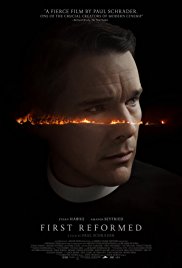 Paul Schrader, director of First Reformed and famed screenwriter of Taxi Driver, Raging Bull, and The Last Temptation of Christ grew up in the Calvinist Christian Reformed Church with a strict family home. He attended Calvin College and graduated with a minor in theology. A frequent collaborator with Martin Scorsese and known for “man-in-a-room” style dramas, Schrader is no stranger to theological treatises or self-destructive narratives in his written or directed films. His latest output starring Ethan Hawke as a self-absorbed yet earnest minister harmonizes these two common themes into a prescient blend of commentary on modern Christianity, politics, ecology, and a survey of the human soul.
Paul Schrader, director of First Reformed and famed screenwriter of Taxi Driver, Raging Bull, and The Last Temptation of Christ grew up in the Calvinist Christian Reformed Church with a strict family home. He attended Calvin College and graduated with a minor in theology. A frequent collaborator with Martin Scorsese and known for “man-in-a-room” style dramas, Schrader is no stranger to theological treatises or self-destructive narratives in his written or directed films. His latest output starring Ethan Hawke as a self-absorbed yet earnest minister harmonizes these two common themes into a prescient blend of commentary on modern Christianity, politics, ecology, and a survey of the human soul.
Ethan Hawke plays Reverend Toller, the pastor of First Reformed Church, mostly a monument catering to a smattering of tourists visiting the historic church and very few local congregants. Most of the people in his denomination attend a local megachurch led by a well-known pastor played by Cedric the Entertainer. Life for Toller is boring and routine as mostly a caretaker of the grounds, giving tours for those who visit it, and hawking–pun slightly intended–chintzy souvenirs commemorating the church building’s once prominent status. It is only the church’s upcoming anniversary that gives Toller anything worth doing until one couple, Mary and Michael, request his counsel for the latter’s depression.
When Toller and Michael (Philip Ettinger) meet, Michael’s depression results, partially, from his radical environmentalism. He has recently been released from jail for demonstrating in Canada and lives in fear of a future world destroyed by climate change. So much so, he wants his pregnant wife, Mary (Amanda Seyfried), to abort their unborn child so the baby does not need to live in this future. Toller’s diagnosis of Michael’s fear is an incredibly spot-on delivery of how a pastor would normally council a man in such a situation. It speaks to Schrader’s upbringing and education in a Reformed tradition and carries no hints of malice or contempt in either how it is written or how Toller delivers it and Michael receives it. The characters are sincere, as is the filmmaking, and it effectively sets up these characters for their later, ruinous spirals.
Toller’s sincerity stands in contrast to his relative malaise as pastor of First Reformed and his only relationships. While his faith is rooted, as previously evidenced, it is bogged down in a thick morass of religious duty and irrelevancy. As his history is made plain to the audience, as well as indiscretions and vices, Schrader further shades Toller in complexity. His tragic past, painful memories, and sorrowful situation make him sympathetic. However, it is a pain he shares alone, unwilling to open up to those who care about him and unwilling to find happiness in maybe the one person who can. Toller stands on the strange, harrowing precipice of someone consumed by grief, torn apart by his circumstances, and a product of Christian culture that often sands down the sharper edges of our lives in favor of piety, status, and, tragically, the bottom line.
Michael’s mission and ideology are taken on by Toller because of the hypocrisy of himself and those around him. It offers clarity but also a prideful duty. He is genuine once convicted but the vision itself is narcissistic and self-serving. the vessel is clean on the outside but sullied on the inside. Eventually, this missional ire turns towards Michael Gaston’s Edward Balq, an industrialist sponsoring First Reformed’s anniversary celebration and a large donor of Cedric’s megachurch. His vision sharpens and turns incendiary when his vices, mainly his self-medication of his pain with many glasses of whiskey, are brought to light.
His alcohol issue is illuminating. Toller is literally poisoning himself with his drinking as he seeks to cover spiritual and emotional decay. Likewise, the movie juxtaposes lack of attention to his own decaying health and his spiritual plight to our lack of care for and poisoning of the earth. As Toller tries to stave off his physical ailments with a cocktail of alcohol and antacids, the church beds itself with corporate interests and turns a blind eye to the poisoning of the environment. The narrative speaks of creation care: nurturing the world God created and has entrusted to us, as well as caring for what he has made in his own image. In our earnestness, we can care for one and neglect the other, both instances having dangerous and, as the movie posits, dire consequences for the immediate and near future. The finale seems to suggest a full embrace of the dangers of self-absorption and echoes Jesus words to the Pharisees regarding the weightier matters of justice, mercy, and faithfulness.
Like Schrader frequent collaborator Martin Scorsese’s movie Silence, an open-ended final moment leaves the viewer grappling with these weightier matters. As much as the movie is a self-contained story of a broken man’s fractured faith, it’s timeliness to more current and political critiques of evangelicalism is far from coincidental. Regardless of anyone’s leanings to the right or left, the larger narrative of creation care should give the viewer pause, especially the confessional Christian viewer. This viewer’s second viewing, and there will be a second, will hopefully shed more light on a movie people will hopefully be talking about for the rest of 2018.
This review is from Josh’s coverage of the 2018 Wisconsin Film Festival in Madison, Wisconsin. You can find out more about the festival by going to 2018.wifilmfest.org.



